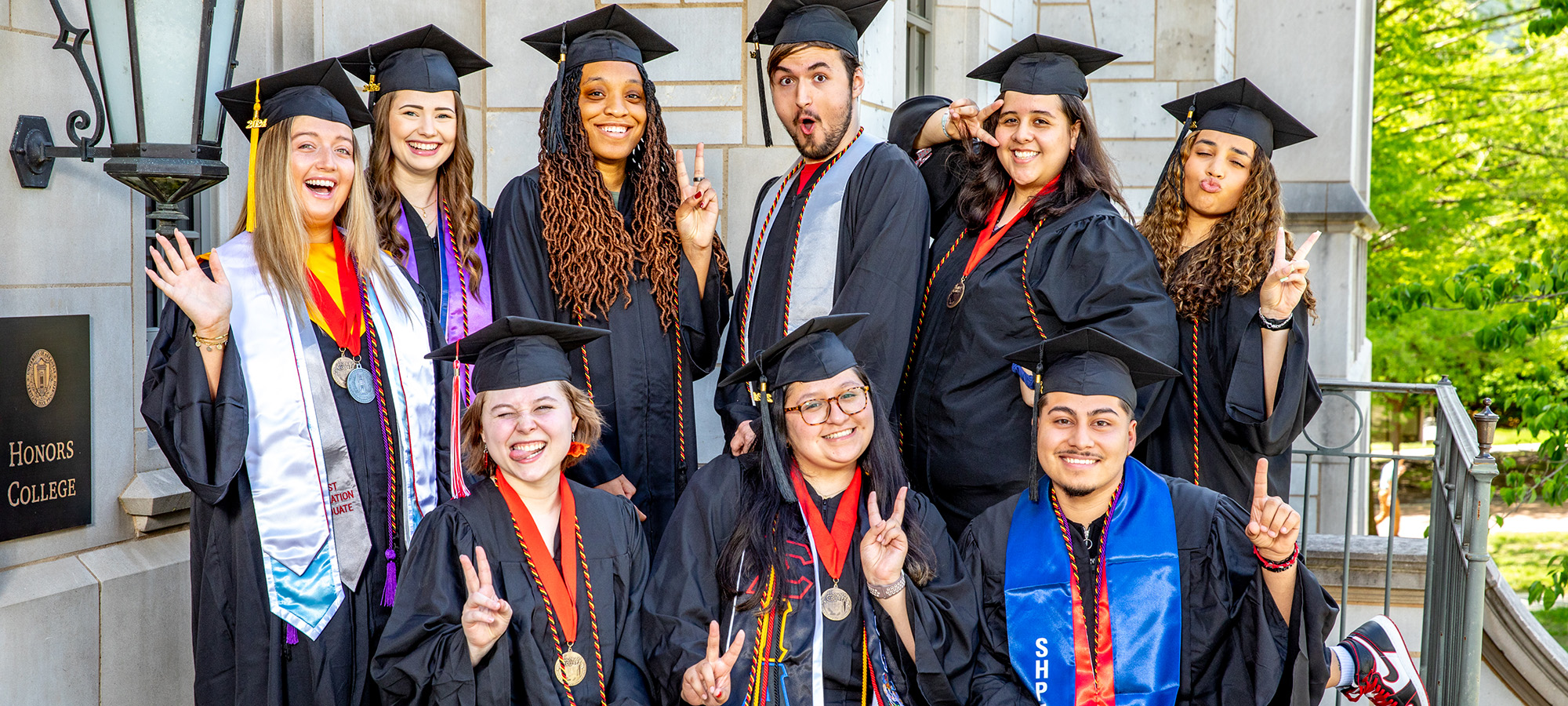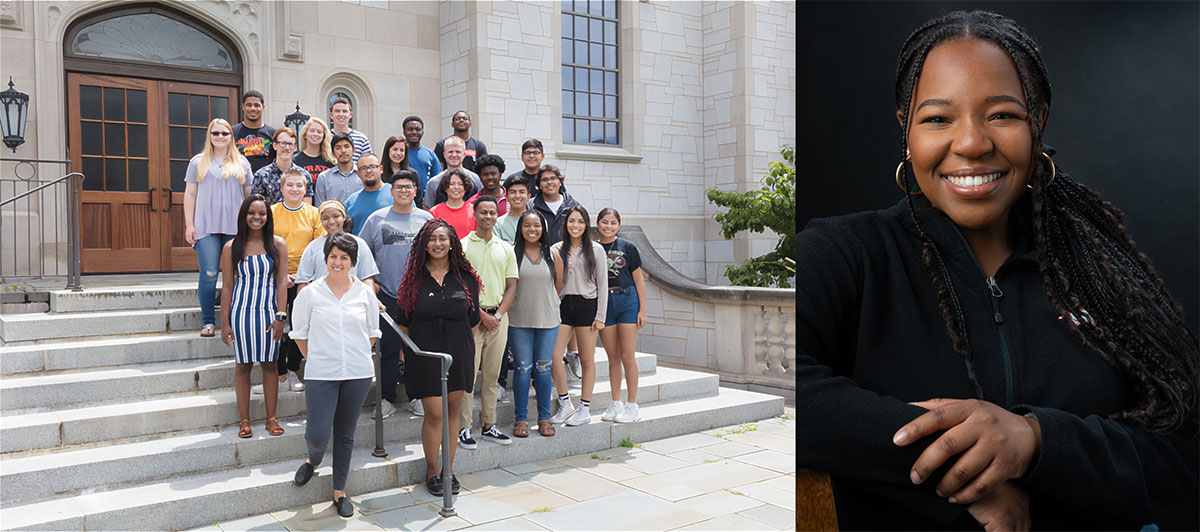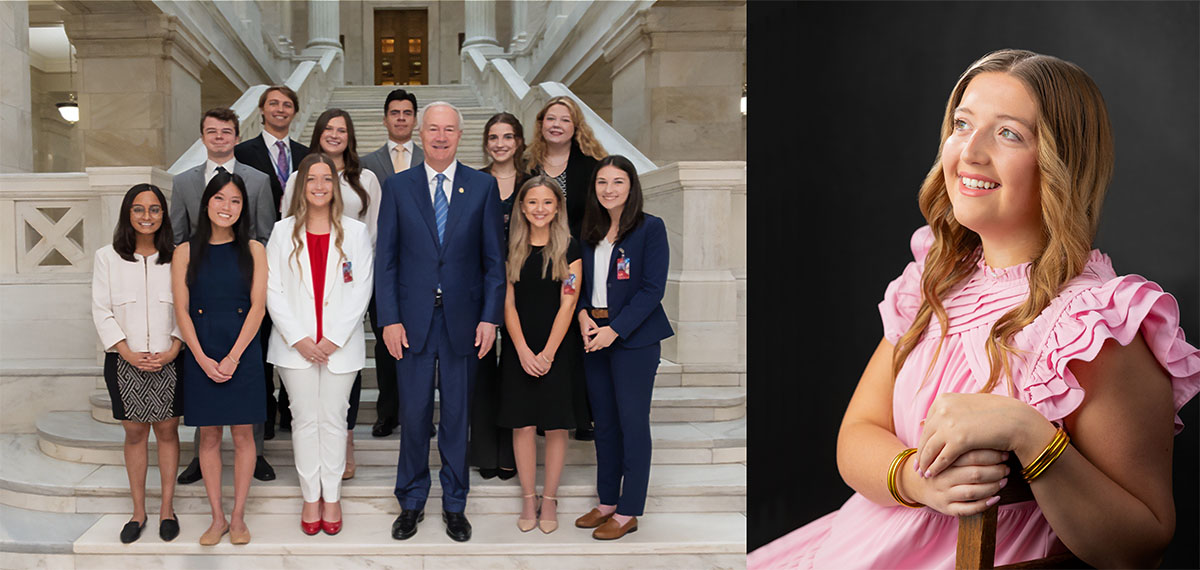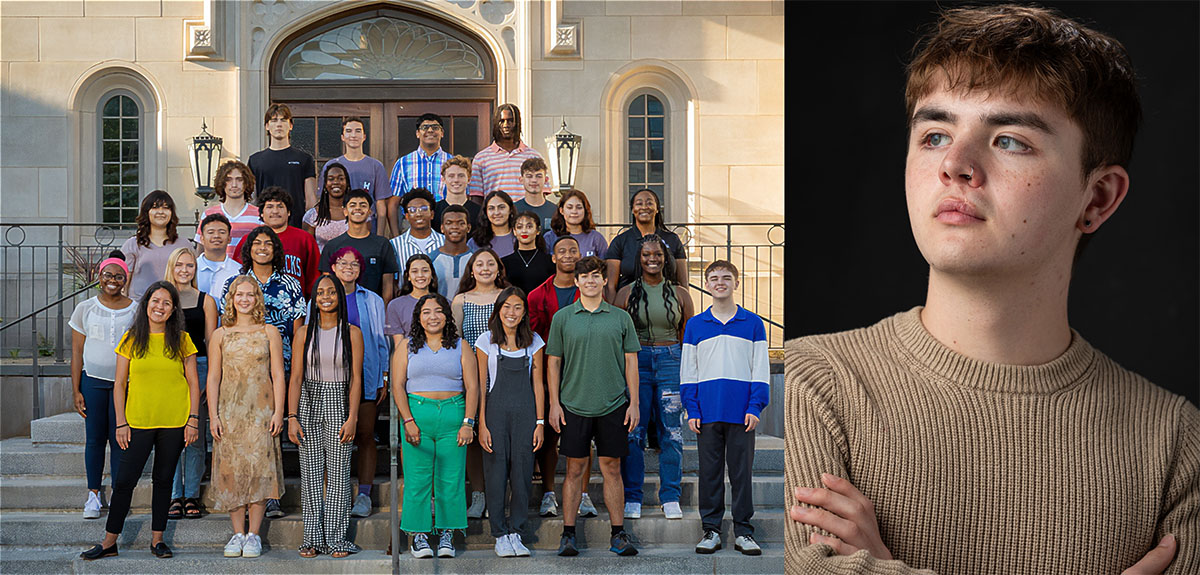
Paths to Student Success
For some, the mention of “Pi,” “Beta,” and “Delta” might invoke images of scientific equations or campus Greek life. For the University of Arkansas Honors College, though, these letters of the Greek alphabet have a different connotation: they represent the cohorts of their Path Program, an initiative that makes the path to graduation a little easier for students who may be the first in their families to attend college.
“The Path Program has set a national standard in honors education for recruiting, supporting and graduating students who are the first in their families to attend college and who come from families with severe financial need,” explains Honors College Dean Lynda Coon. “It has created strong pipelines into high schools from around Arkansas and has graduated top scholars from the U of A.”
After 10 years of existence, the Path Program counts 84 alumni from all of the colleges and schools on campus.
Since the program was established in 2014, each cohort has been named after a letter of the Greek alphabet, and these cohorts have provided lasting bonds among the scholars – not to mention a campus family, of sorts. From Alpha (the inaugural graduating class of 2018) and beyond, all Path Scholars benefit from an annually renewable scholarship, shared housing, academic success advising, and peer and professional mentoring, as well as study abroad, research and internship opportunities. Over the last decade, Path scholars have graduated and excelled in a wide range of career paths, like designing medical devices for mothers and children in sub-Saharan Africa, practicing speech therapy in Spanish-speaking communities, managing business insights and analysis at Walmart and working in public relations at Crystal Bridges.
But what’s it really like to be involved in the program and have access to a community focused on your success? Lizeth, Breanna, Madison and Brylan share how their experiences have shaped their lives – and their futures.
LIZETH
When Lizeth Martinez reflected on her time as an undergrad, she remembered the Sundays. Once a month on Sunday, her Path Program cohort would meet and update each other on life and school.
“How’s life?” Martinez recalled. “What have you accomplished? What are your dreams? Those are my favorite memories of college.”
Martinez is close to achieving her dream of becoming a Doctor of Physical Therapy after graduating magna cum laude from the U of A in 2021 with a B.S. in exercise science and kinesiology. Inspired by her mother, who works at a pediatric clinic in Springdale, Martinez pursued a career in helping people with their mobility and independence. In 2024, she accepted a traveling physical therapist position.

As an undergraduate, Martinez didn’t know what resources were available to her on campus. “I didn’t know what a scholarship or graduate school application looked like,” she shared. “With Path, I realized I could keep going after college – I could keep going with this dream.”
Growing up in Prairie Grove, Martinez saw there was a large Spanish-speaking community, but not many therapists who were bilingual.
“I thought pursuing a career in healthcare would be impactful,” said Martinez, who is fluent in Spanish. “I want to help better serve the Hispanic population.”
Through the Path Program, Martinez grew comfortable with taking chances.
“Don’t be afraid to fail,” she advised. “Failing is inevitable. It’s the only way you grow as a person.”
BREANNA
Breanna Kilgore grew up watching friends and family travel more than an hour to Louisiana or Little Rock for specialized medicine. In extreme cases, residents had to be flown by helicopter to the UAMS Medical Center or Arkansas Children’s Hospital to be treated.
At first, Kilgore didn’t understand why her hometown of El Dorado, Arkansas, did not have access to certain medicine, so she started reading about healthcare structures, rural medicine and medical inequities. Her path was solidified during a scholarship webinar when she heard a presenter say, “Whatever you do in life, make sure you love it. And whatever makes you really angry or really sad, that’s what you’re passionate about.”

“I get really angry when people don’t have access to doctors, nurses or medical devices because of a price tag or infrastructure,” Kilgore said. “It shouldn’t be a privilege to be healthy. We should work as a community to make sure everyone can be the best they can be.”
Combining her love of technology with her passion for healthcare, Kilgore majored in biomedical engineering with the dream of creating medical devices and being at the forefront of scalable and accessible innovation.
“Path pushed me out of my comfort zone,” Kilgore reflected. “The team encouraged me, built my confidence and gave me a support network so I could finish my undergrad with honors and succeed after graduation.”
Kilgore saw the Path Program as an integral bridge to higher education for students from underrepresented communities.
“If people back home had the support system I’ve had, the possibilities would be endless,” Kilgore said. “Growing up, I watched a lot of people do jobs they hate. It was work that was grueling and hard for them. I am so grateful to have this opportunity to explore something I love. It’s a great relief to know I’m doing something I’m interested in, and that will have an impact on the world.”
MADISON
Branch, Arkansas, population 302, is home to six churches, one gas station, County Line High School and Madison Price. Price graduated from high school alongside 33 other students, and she was the only student in her class to attend the U of A. Branch is proudly a small town, and that’s what Price loves about it. It’s a “close-knit community” and “everyone gives you advice and tips about life.”
When thinking about her college experience, Price knew she wanted a community that felt like home, and she found that in the Path Program.
Price studied agricultural business – an industry that is close to her heart. She grew up on a small cattle farm and has always loved the business side of agriculture. Throughout high school, she was active in Future Farmers of America, student council and even showed pigs at the county fair.
“I appreciate my experiences on the farm,” Price said. “That’s why I’m such an advocate for agriculture.”
Through her connections in the Path Program, Price got first-hand business experience interning for Arkansas Gov. Asa Hutchinson after her freshman year. Through encouragement from mentors, she also studied abroad on a service-learning project in Belize, where she built chicken coops and installed above-ground gardens. Price’s education and the experience gained on her family’s farm have led her to make connections throughout the state and around the world.

“It’s hard to believe the Path Program has led me to so much,” Price said. “Path connected all the dots for me in my education. It made me a better person personally and professionally. I have an open mind, open ears and I’m ready to take advice and run with it.”
BRYLAN
Brylan Cole is well-acquainted with 30-minute commutes. As the Sharon Killian Endowed Intern at the Crystal Bridges Museum of American Art, he made the drive to Bentonville weekly, but it was worth it to be immersed in his passion – studio art.
Before he came to the U of A as a Path Scholar, he drove more than 30 minutes daily to high school. His hometown, Bergman, Arkansas, “did not have the opportunities” Cole needed to get to art school, so he trekked to a larger school every day.
“[My family] grew up with very little income,” Cole said. “Art was a form of escapism.”
After taking art classes, he quickly developed skills in painting and drawing, but it was sculpture that resonated with Cole.
Cole can open his art journal and find the word “Path” scrawled between notes about his experience at a summer art workshop in high school. It was the first time Cole heard about the program. As a first-generation high school graduate and college student, Cole knew he needed advice and accountability to reach his potential.

“I can’t ask my dad, mom, grandmother or anyone in my family about the things I’m experiencing [at university],” Cole said. “The Path Program had the mentorship I craved, and it gave me community on campus immediately. I can operate on my own, but it’s important to have people who understand how this institution works – they understand higher education.”
Incoming Path students attend a two-week bridge program where they move to campus early, take classes and make meaningful connections with one another. Cole remembers staying up until 2 a.m. talking to the other students every night.
“We started hanging out constantly,” he said. “It was so reassuring for me to meet people from different parts of Arkansas and the country who had shared experiences,” he reflects.
THE PATH AHEAD
Coon says the future of Path is “bright indeed,” thanks to the drive and intellect of the Path students and the “selfless devotion to them of our Path staff.”
After seeing so much success in the first decade of existence, one can optimistically imagine how the program’s current and future students will change the world – through their volunteerism, research, activism and other scholarly pursuits.
Like Lizeth, Breanna, Madison and Brylan, these students will forge their own paths – from the hallways of Arkansas high schools to Senior Walk at the U of A – and leave the world better than they found it.